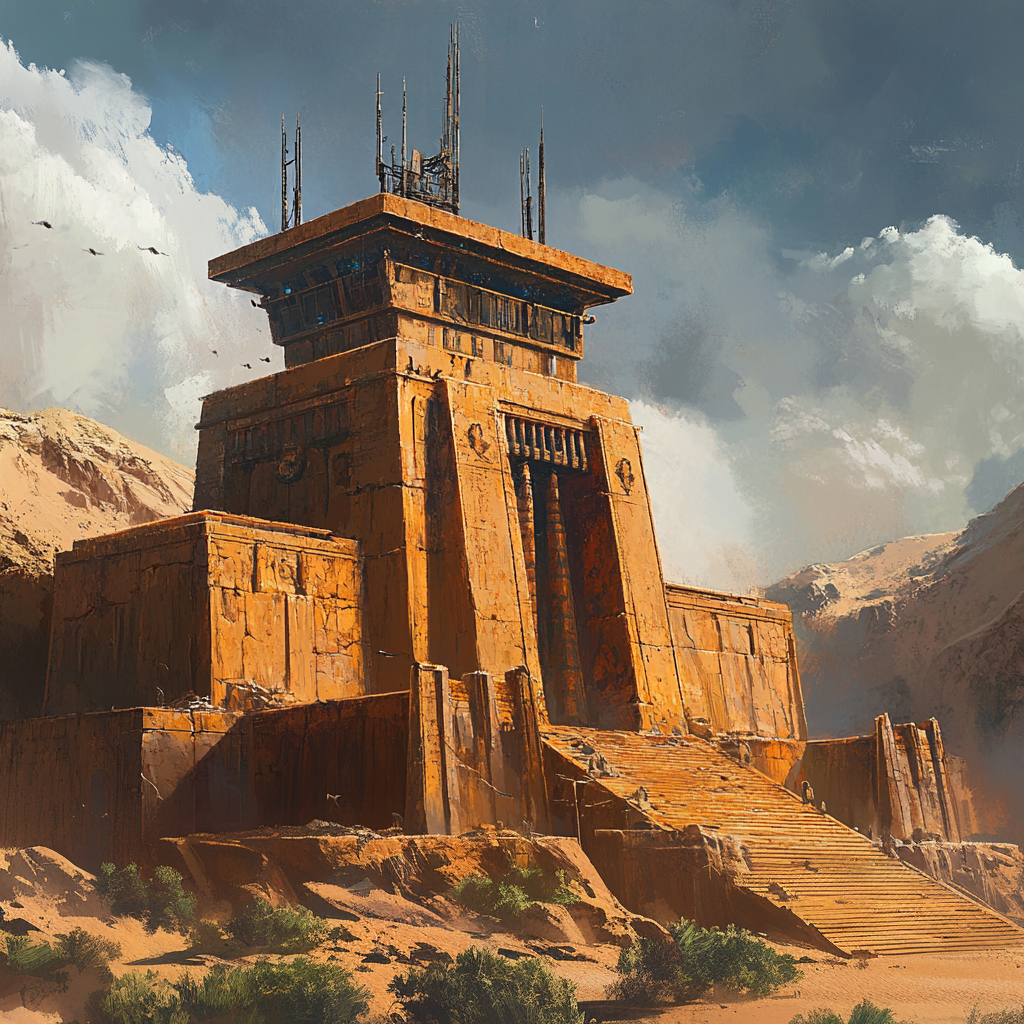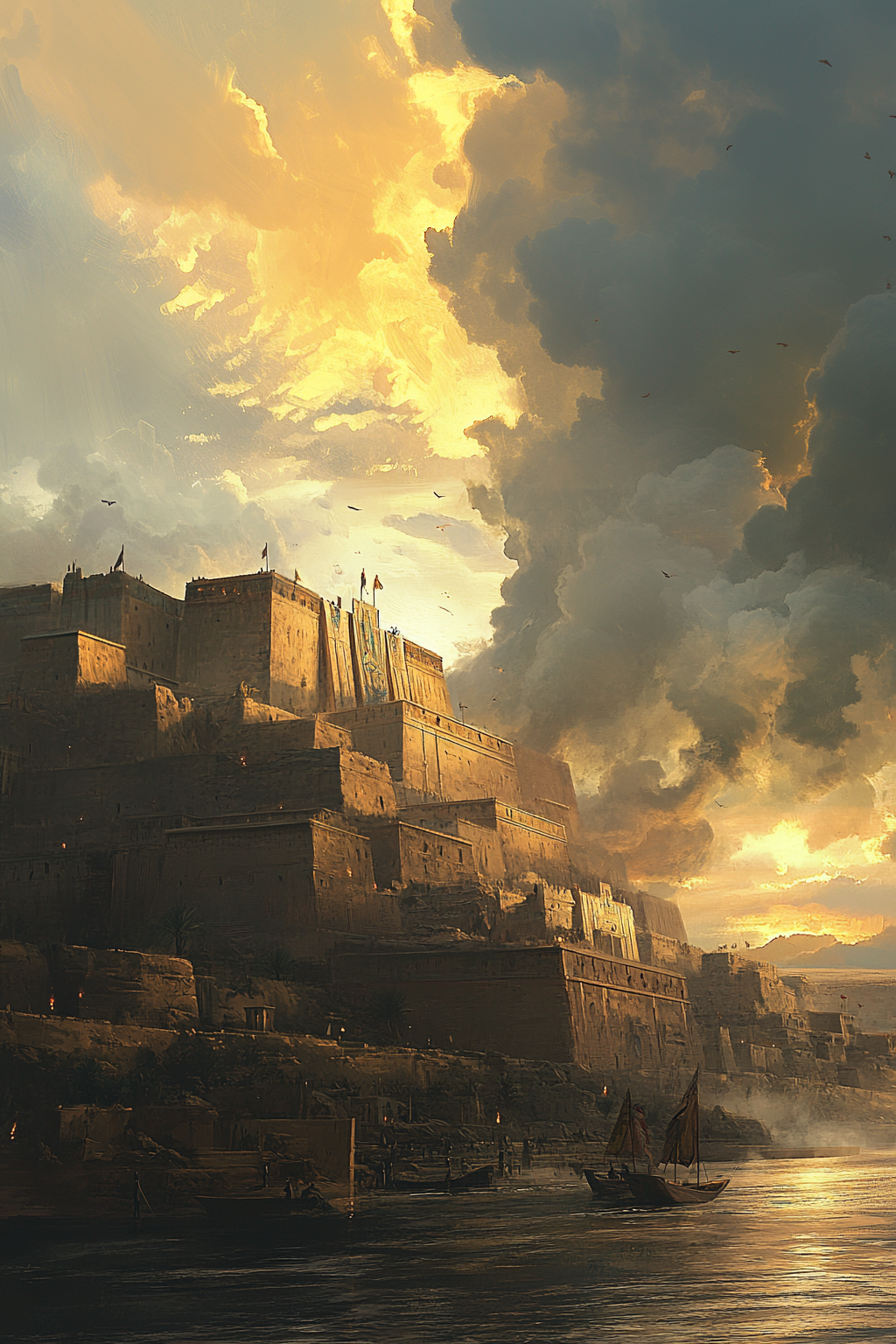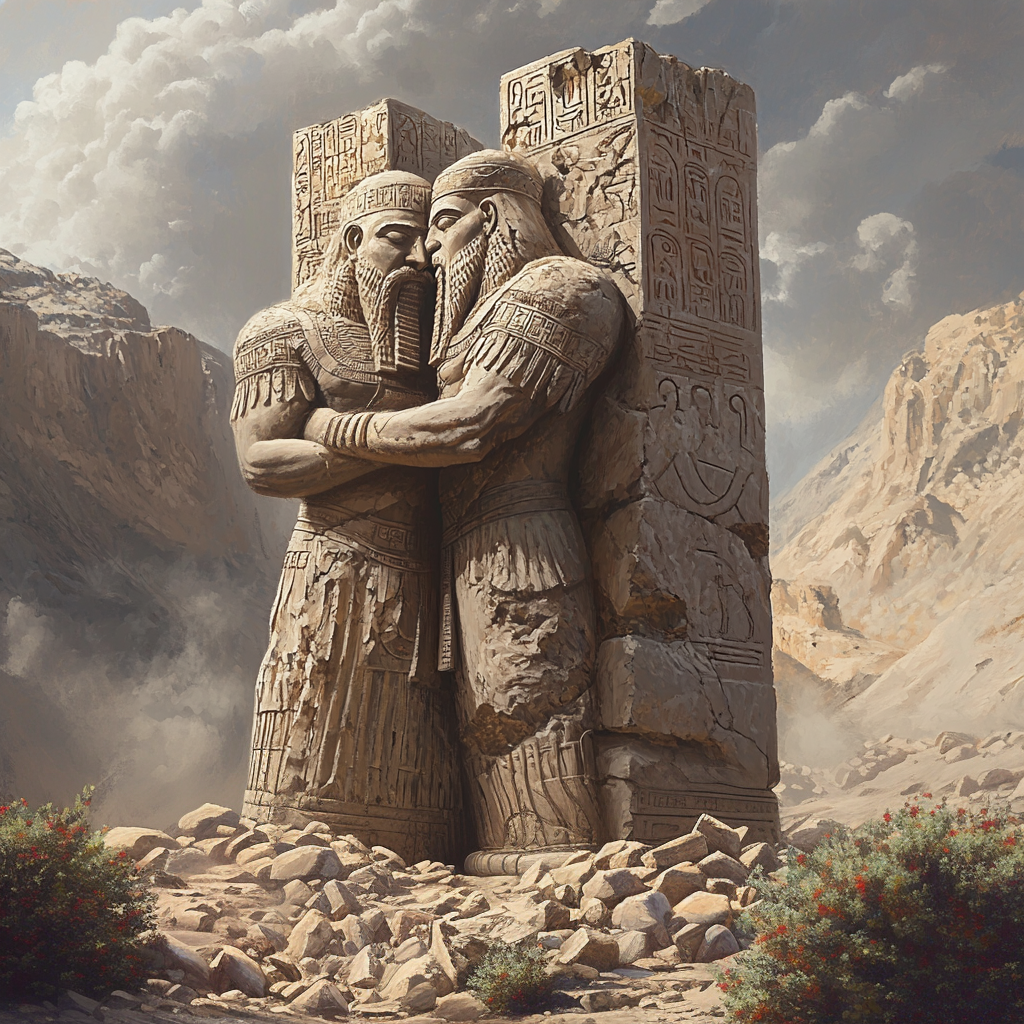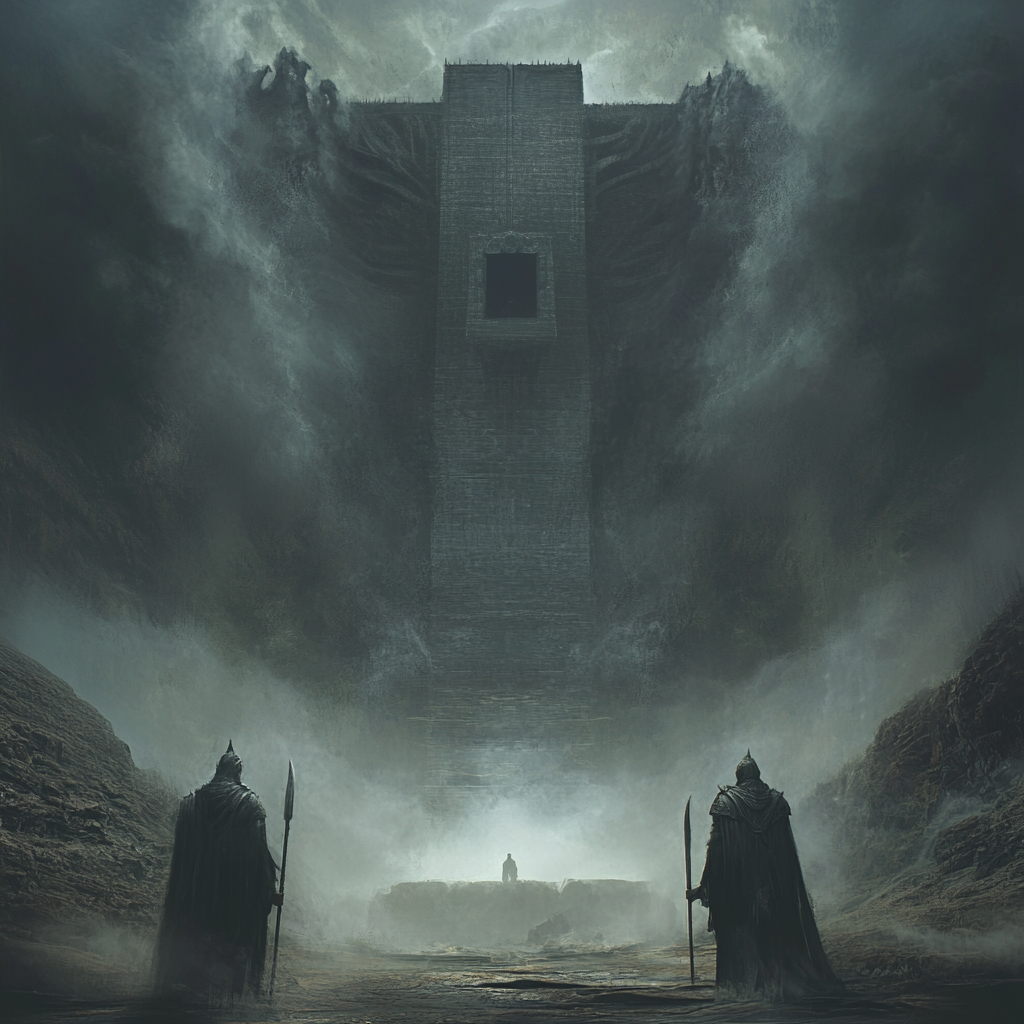Death of the Divines
Fall of the Silent Ones
Our forefathers were right to cast down the corrupt and the wicked, although I doubt whether the beings they defeated were even divine in nature.
The Silent Ones
Long ago, when the world was still young and mankind struggled to find its place within its vast forests, mountain heights, and open plains, the Silent Ones spoke from up high, bestowing their weary faithful with the knowledge that kept them from harm. Only the wisest among men, those who had settled the southern tip of Tellaiti, had the attention and the guidance of their heavenly lords, giving their folk a clear advantage over their inferior neighbours whose prayers had fallen on deaf ears. The ancient precursors to the Brelish people showed great restraint and strived to serve their gods by using their knowledge and power to protect the rest of humanity, defending the world against the evils that lurked within the depths of darkness.Cosmic Calamity
Despite their faithful service to the divines and their efforts to protect humanity, the gods had fallen silent. The ancient temples with great towers that reached out into the heavens had lost contact with the celestial realm up high, leaving mankind without guidance. Priests and other wise men and women speculated that a great calamity was afoot—something with the power to disrupt the communication of the gods themselves. So great was their belief in their masters in the heavens that the thought of abandonment had failed to cross their minds. Great sacrifices were made day and night—beginning first with mere material possessions, but as the silence prevailed the desperation of the faithful had grown to lead them down a darker path, one involving the ritual slaughter of their own brothers and sisters, but to no avail. The silence had remained unbroken.Descent into Tyranny
Months of silence had turned to years of fruitless slaughter and needless death. Whole generations grew up without the voices of the divines to lead them to prosperity, and hope had dwindled across the land as the golden days of the Tellati civilisation seemed to come to an end. Mankind was forced to put their trust in the hands of mortal men, rulers chosen from among their own ranks who were both wise and mighty. Great giants among men who cared not for the false promises of the pathetic priests that still cried for their heavenly masters and demanded a constant supply of fresh blood for their stained altars.Desertification of the Land
It had taken nearly a century for the abandoned people of Tellaiti to witness a sign from their divines—a sign that had presented itself in the form of a great drought. The Silent Ones brought punishment and pain upon their people, yet their temples remained silent—their priests lost without guidance and understanding. Anger and resentment swelled in the hearts of men as their rivers dried and their families starved, but what hope had they against powers beyond their mortal comprehension?Bringers of Plagues
As if the drying of the earth and the starvation of its inhabitants had not been enough, the gods then saw fit to inflict a devastating plague upon those who still stood. Whatever faith the people once held in the benevolence of the old gods had vansished and large mobs assembled to strike down the priests who still yearned for fresh blood and cursed the masses for their defiance. The last of the faithful had not been immune to the vicious contempt of the divines as many from their own ranks fell victim to the horrendous disease that ravaged throughout the land, killing even the greatest and most pius without mercy.Rise of the Greats
Blood of my blood, what use have we for men whose prayers appease none but their own vanity? Let us be rid of their yoke and then cast down their masters themselves!Led by two mighty giants—kings who towered above their soldiers with chests as broad as pillars—the rebellious populace rammed down the doors of the ancient temples, slaughtering all within the sacred halls. The fury of the people had brought together old rivals who had, for generations, spilled one another’s blood as their shared hatred of the tyranny of the divines was greater than their frivolous squabbles. Tleusukūmai, the King of Lūnaiceq, fought side-by-side with Hlaucole, the King of Cārai, leading the charge against the wicked priests that had stained the halls of the temple with the blood of the innocents.
The Kings' Path
With the priesthood massacred for their crimes against mankind, the victorious warriors looked to the heavens, wondering how mere mortal men could bring down the gods themselves. As they contemplated and feasted, reveling in their righteous victory, the two kings laughed and cheered, for their bonds had grown strong and their minds were set on a new and beautiful future, free of divine tyranny. The next morning, when the soliders were still asleep, the great kings set out together on their quest to bring the fight to the gods themselves. Miles passed within mere hours and by midday their feet had already reached the base of the great mountains. Through close cooperation and sheer determination, the two were able to scale the great height with relative rease, reaching the summit as the sun had begun to set on their lands below. All that remained was to pass the final hurdle—the great gap between heaven and earth.Foreboding Signs
Tleusukūmai and Hlaucole knew they would need all their wisdom and might to subdue the gods themselves and, therefore, it was important to rest and recover their strength. With their great might, the two carved into the mountain with their bare hands, forming a cavern that provided shelter from the elements and the wrath of the divines. The two kings lit a fire and huddled together for warmth and comfort, drifting into a deep and restful sleep. Deep in their slumber, both men received strange dreams with visions of things to come. Tleusukūmai saw signs of a shattered landscape with a terrible crater, filling his heart with dread. The world around him had transformed, however—the broken ground turning into a lush paradise and what once had been the crater had become a beautiful and idyllic lake. Hlaucole's vision of the future had shown him Tleusukūmai in despair and mourning—the people of Lūnaiceq and Cārai united beside him. When the two of them had awoken at last, Tleusukūmai shared what he believed was a vision of the paradise to come following their eventual victory, while Hlaucole spoke of the unity that he'd foreseen, neglecting to mention the grief of his companion.Fall of the Heavens
No man will lament your fall, for all our tears have long been spent on the brothers and sisters whose shriveled and diseased bodies we’ve had to burn and bury, the stolen children whose blood you drained. Your names will be forgotten—lost to the sands of time, as mankind shall find its own path in the world and prevail against the light of the heavens and the darkness of the depths. The hearts of men shall forever be free of your unjust rule, for our spirits are strong and our resolve unbroken.With their strength renewed, the two kings looked to the skies, exchanged words of encouragement—grabbing a hold of one another—and simultaneously lifted and tossed each other into the skies, defying all notions of mortal logic and physics. Soaring through the clouds, they marvelled as the celestial realm emerged around them. In the distance, they saw an immense rectangular building adorned with the ancient script of the priests. Two figures, wreathed in shadow, stood vigilant before the structure, and a third at its base. The land of their gods had seemed as if some evil had seeped into its essence, twisting it into an unrecognisable affront to the hearts of men.
Last of the Gods
Even from a great distance, the voice from the base of the building echoed throughout the land, warning the heroes to turn back, yet the corruption and evil of the land had only harderned Tleusukūmai and Hlaucole's resolve. Approaching their targets, they soon realised that the three figures towered over them, yet their eyes were sickly and their teeth rotten. The Speaker announced that they were in the presence of the gods, but where once had been a large court of divines, only three had remained. The kings paid no heed to the corrupted god’s demands of fealty and submission, for they were mighty kings among men and they were there to secure the eternal independence of their peoples. As they readied their hearts and minds for the final fight, Hlaucole realised something strange about the two guardian gods and began to doubt whether they were at all real. Pointing at one of them, he denounced the aberration as a trick of the light and a meek shadow compared to the bright and noble heart of humanity.Divine Defeat
The figure shrivelled up and screeched, vanishing in a cloud of darkness as all its weapons and armour turned to dust. Before the kings could repeat the process on the other guardian, however, the creature formed into a ball of darkness that struck the King of Cārai in the heart, bringing him to one knee. Hlaucole’s eyes began to weep tears of blood, but he found the strength to stand, pointing his ancestral sword against the last of the Silent Ones and delivering a final message and warning before launching himself into the fray. Weakened from the shadow that had gripped his heart, Hlaucole’s sword arm faltered, leaving him exposed to the long and sharp claws of the twisted god. Still, despite the grave injury, Hlaucole stood with Tleusukūmai beside him. The might of two mortal men—giants among their peoples, leaders of a revolution against divinity itself—overpowered the pathetic excuse for a divine, bringing the Speaker to its knees. In a desperate attempt to bring ruin upon the kings, the last of the Silent Ones shattered the heavens, bringing all that was left of it crashing down on the world below, the heroes survived the fall, landing in a soft bed of mountain snow as the wretched aberration crashed into the earth, leaving a massive crater in its wake.Unification of the Tellaitians
May our people forever honour the love we shared and the blood we spilled together. No longer will we spill each others’ blood in needless wars, but instead share in the joys of companionship.Hlaucole had survived the fall, but his injuries still festered and he knew his days were at an end. Embraced in Tleusukūmai’s arms, the dying king offered his companion his daughter’s hand in marriage so that the era of blood and sorrow could come to an end and that the Tellaitians could be united at last. Tleusukūmai accepted the offer and wept as the life faded from Hlaucole. In his sorrow and grief, the king punched hard against stone, breaking open the mountain itself. A great flow of water emerged from its bottomless depths, flowing out into dry and decrepit plains below, filling the crater that the fallen god had formed. The lake would later bare the name Clēqhuap and from its waters a new divine would rise, one who embodied the virtues and love of mankind—a saviour against the tyranny of the aberati. (?)
United People
Tleusukūmai descended from the mountain, his fallen companion in his arms, and the people of Lūnaiceq and Cārai welcomed their heroes with both joy and sorrow. Laments were held in honour of the fallen and the king was quick to announce his marriage to the daughter of Hlaucole and the new unity and friendship of their two peoples. To many, he who had defeated the gods themselves had ascended to a position comparable to the divines. He may not have controlled the weather and the plagues, but he did bring down a great river to heal what the gods had caused, bringing life and fertility to the land.Blossoming Paradise
The reign of Tleusukūmai, King of Kings, was an era of blessed prosperity and peace for all the inhabitants of South Tellaiti, leading to a new golden age for their civilisation. Great cities were established, many of which were adorned with gigantic statues of the two heroes that had saved mankind from the tyranny of the divines. Each of the new cities came with a vast library that contained the entire story of the Death of the Divines on clay tablets, many of which have remained intact to this day. Only a few segments of the tale have been lost to time as the tablets have sustained damage and deteriorated.
Date of First Recording
c. 800 BA
Date of Setting
c. 2000 BA
Related Ethnicities
Related Locations
Brelish Perspective
The contemporary Brelish people, descendants of the Tellaitians of old, have a completely distinct relationship with faith than their predecessors. Brels are often called the People of the Lake, a token of their connection and kinship to Aprēa of Setaik, the God of Mankind. They are commonly viewed as an extremely religious people whose culture and faith are basically inseparable and so it might seem strange that this ethnic group has had such extremely different views of the matter, but from the Brelish perceptive their ancestors were perfectly justified in their rebellion against the Silent Ones. Aprēaq Hūril considers the old gods of the Tellaitians to have been powerful entities that were likely somehow corrupted by the influence of the aberati, turning these so-called deities into horrific monsters and arbitrary tyrants. The destruction of the Silent Ones was therefore a justified step to free humanity from evil and an important act that had led to the eventual rise and ascension of Aprēa, a god who is both human and divine. The dark age of slow and continual deterioration and decay that followed the brief Tellaitian golden age is often viewed as a sign that despite their righteous act in casting down the false gods, mankind has an intrinsic need for a loving and caring figure capable of providing hope and guidance, justifying their faith and trust in Aprēa.The Giants' Names
Tleusukūmai and Hlaucole are modern and updated forms of the ancient names of the two kings that vanquished the gods. The names are meant to convey as much of their original meaning as possible, giving a hint to how the ancient people may have percieved them. Tleusukūmai's name comes from the words tleusu and kūmai, the former being an adjective to describe something or someone that is great or enormous—either in physical stature or status—or someone who is loud. Kūmai is the Aiterean word for a soldier or warrior. Based on the name itself, scholars and storytellers have often considered the king to have been a boastful and imposing figure, frequently laughing and singing with his people with a loud and booming voice that rang across the land. The name of Hlaucole is formed out of the adjective hlau and the noun cole, the latter being a word for hero, while the former is something that's used to describe people that are wonderful, good or superb in terms of their personality or moral character, but the word is also frequently used to describe those who are particularly attractive. In some situations, it can also be associated with characters that are warm and kind-hearted. Such a name would imply that Hlaucole was likely an extremely attractive and desirable man, both in terms of his personality and his physical appearance. His status as the King of Cārai would have affected people's perception of him as well, but his noble linigage and power alone would not have been sufficient to earn such a grand name.Loss of Contact
The ancient temples of the Silent Ones were once equipped with great metal towers that facilitated communication between the humans on Riel and their celestial comrades onboard the UNS Hope. They were the last of the humans to leave behind the great space station, a colossal spherical structure that is now believed to be Vol, a moon.
Those left behind on the old space station continued to assist their departed brethren on the planet, using their vast collection of knowledge and superior technology to inform mankind of various threats and dangers.
It is unclear whether something had happened to the crew of the Hope—perhaps in a similar manner as how the gods who they inspired were corrupted—or whether the ancient devices the priests used for communication had merely deteriorated to the point of obsolescence, but the consequence of it all was viewed as the silence of the gods and the desperation of the priests that had grown reliant on their old machines. Few signs remain of the advanced technology possessed by the ancient Tellaitian clerics, as most of the temples were torn asunder, either through the acts of angry men or because of natural degradation. Only a few clay tablets that depict the events of the old myth offer any clues to the mysterious past, as a couple of old temples are depicted on a few of those, all adorned with strange towers prodding out from flat rooftops.









What a great article. I love the image of the old kings tossing each other up into the air - that's such a myth thing. :D I also really like that their names are not their actual names, but more modern names they have been given by people.
Explore Etrea | WorldEmber 2025
The mutual yeeting looked ridiculous in my head but how else is one supposed to reach the sky? :D
Maker of Maps